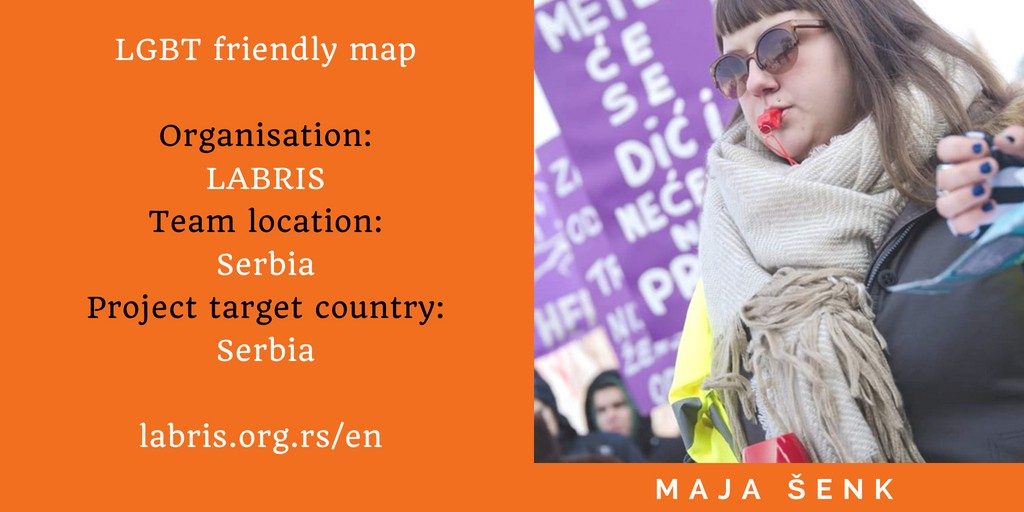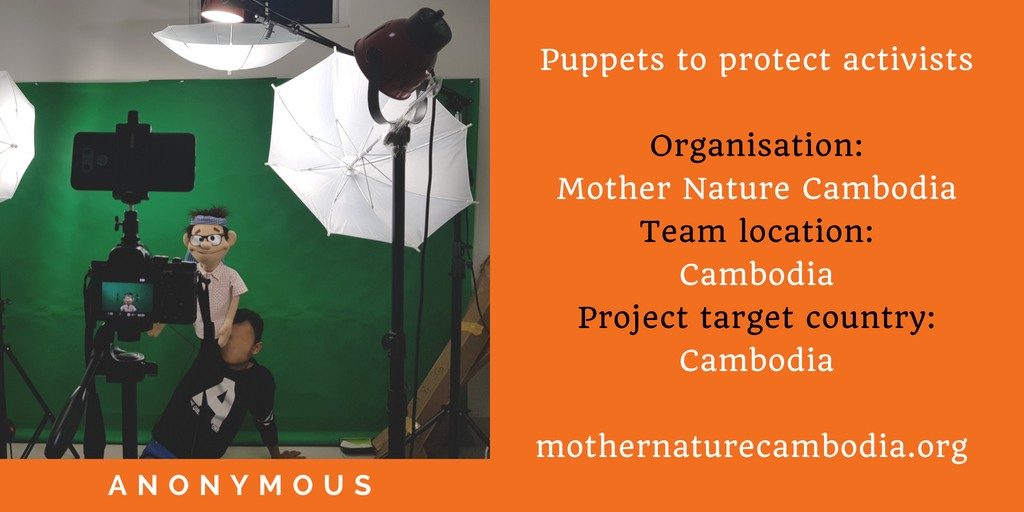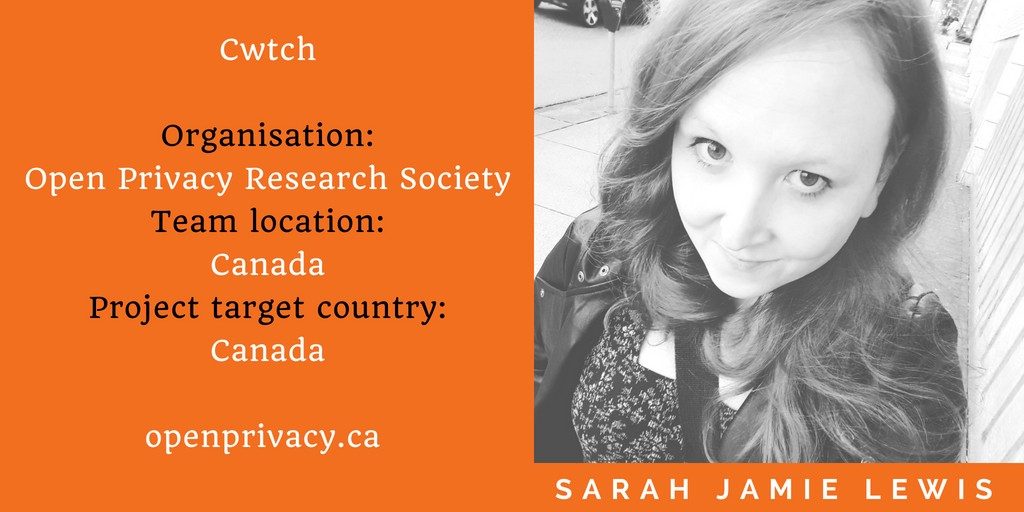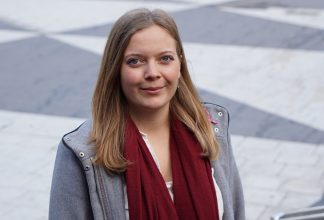Innovation Challenge 2018: Meet the Second Round Applicants, Part 1
On Monday the 18th of June we closed the second round of Innovation Challenge 2018. The second round tested 16 of our applicants further, asking them to elaborate on their plans.
The results are now being processed and a lucky few will go through to the third and final round before our jury decides who wins. Today, however, we will introduce three of the participants of the Innovation Challenge (IC). Two of them applied within the theme of Creative Communications, and the third on Digital Safety and Security.
First up is Maja Šenk and the organisation LABRIS, a lesbian human rights organisation based in Serbia. Their mission is to create a more equal society by advocating for the elimination of all forms of discrimination and violence against lesbians.

“Our vision is a society without hate or fear, and with rule of law; a society where sexual and gender minorities would have equal rights to the majority.”
Identifying as a minority herself, she decided to engage in human rights and stand up for herself and other women, lesbians and bisexuals. Determined to improve everyday living for this community, she applied to the Innovation Challenge with the idea of an LGBT-friendly map. The aim is to make useful and vital information easily accessible, ranging from where to go out and meet like-minded people to where a friendly doctor can be found. LABRIS hopes that this tool could help both LGBT-people and human rights defenders alike, and they wish to cover a bigger geographical area:
“We hope that this map will be of great help to people living in small cities and villages in Serbia, not only for people in the bigger cities.”
LABRIS and Civil Rights Defenders have been working together for many years, which is one of the reasons Maja Šenk decided to apply.
“We hoped that both the IC and Civil Rights Defenders would recognize the importance and innovativeness of our idea, and help us turn it into reality.”

Let’s circle the globe and find our next competitor, an artivist group from Cambodia in Southeast Asia. For five years Mother Nature Cambodia has been fighting to preserve threatened natural terrains, and they do this through the use of hand puppets and videos distributed over social media. They want to win the challenge to finance the recording of videos, displaying actual footage from the ground, using humour and art to inform on issues such as mining, logging, land rights and pollution.
“We also hope to inspire other human rights and environmental activists to follow our idea and add elements on fun and humor in their work against the increasingly repressive Cambodian regime.”
The puppets help to lighten the heavy topic of environmental exploitation, but they also serve another purpose. Environmental rights is a sensitive issue to engage with in the country, and the puppets therefore serve the purpose of anonymising activists identity and thus increase their safety.
Despite the risks, Mother Nature Cambodia continues to create, with the reward of some of their videos receiving millions of views. Already having plans to take this puppet video concept further, they heard of the IC through a friend and fellow human rights defenders.
“We took a look at the website and thought it would be a good fit for our puppet plans.”

Continuing halfway around the globe, we arrive in Vancouver, Canada, where Sarah Jamie Lewis is running the organisation Open Privacy Research Society. It’s an organisation that believes that all systems should respect and enforce consent, and are therefore developing tools and building strongly protected spaces online for marginalised communities. The aim is to put the control and security into the hands of these digital rights holders, preventing safe and organisatory spaces from being shut down, seized, or placed under surveillance.
“We are concerned about the centralisation of technology, and the harms brought about by the concentration of power. Nowhere is this felt more acutely than in marginalised communities.”
The idea Sarah and her team sent to the IC was the development of a group messaging protocol and platform, one that is privacy-preserving, encrypted, decentralised, and metadata resistant. They named it Cwtch, borrowing a word from the Welsh language which roughly translates to “a hug that creates a safe space”.
“Cwtch not only encrypts the content of the communication; it also protects the context of the communication — making it very difficult to censor or place under surveillance.”
Sarah asserts that Open Privacy Research Society shares the same values Civil Rights Defenders does, namely to protect civil and political rights worldwide.
“Our research and tools are built and tailored to specific communities, who we work very closely with. It isn’t the kind of work that attracts VC funding or donations from a large user base. The Innovation Challenge, therefore, provides us with an opportunity to push our research and build a refined product.”
—
At Civil Rights Defenders we know how important digital rights are for our partner human rights defenders, and we’re a constant witness to the struggle that comes with partners being shut down, censored, or persecuted for exercising their civil and political rights. We welcome ideas like Cwtch, with the angle of protecting our partners, or ideas such as the LGBT-friendly map from LABRIS, which is all about connecting people and providing a tool for a marginalised community so they will experience greater access into vital services and pleasures. Finally, in a world where human rights are on decline and these topics seem heavier than ever, it is vital to make civil and political rights understandable and easily accessible to the public. Mother Nature Cambodia shows with their proposal that they have understood this, and want to enlighten and engage citizens, while inspiring and honouring the work of human rights defenders.
Together, these organisations and brave individuals show the great need for innovation on human rights, and what challenges are existing globally. They are changemakers in their communities, and as human rights defenders they are a part of a great community. A community which we at Civil Rights Defenders are proud and honoured to be part of, and able to support.
Join us next time when we will introduce Sawsan Nashashibi and her team of feminists who want to create “an awesome feminist library”, and Jorge Eduardo Benet Sánchez Noriega with Cooperativa Tierra Común, a worker-owned cooperative who wishes to develop innovative tools to use in digital security trainings. Stay tuned for the second part!


